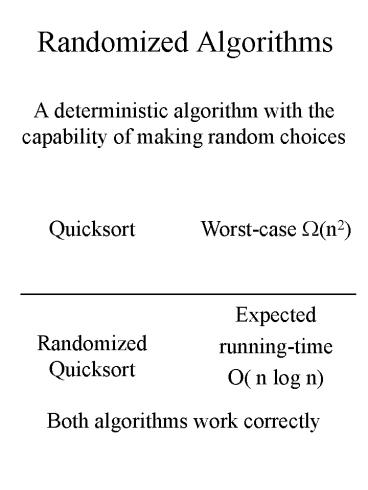Randomized Algorithms - PowerPoint PPT Presentation
1 / 5
Title:
Randomized Algorithms
Description:
the Legendre symbol. 1 if x is a quadratic residue. modulo p -1 otherwise ... Legendre symbols can be computed in polynomial time. Lemma: Euler Criterion ... – PowerPoint PPT presentation
Number of Views:66
Avg rating:3.0/5.0
Title: Randomized Algorithms
1
Randomized Algorithms
- A deterministic algorithm with the capability of
making random choices
Quicksort
Worst-case ?(n2)
Expected running-time O( n log n)
Randomized Quicksort
Both algorithms work correctly
2
Primarily Testing
- PRIME given a positive integer n in the binary
form, determine whether n is a prime number - GOAL a randomized algorithm that solves PRIME in
polynomial time, with an arbitrarily small error
probability ? - Set Zn, for any n gt 0
- Zn x ? N ?0 lt x lt n, gcd(x, n) 1
- If a number p is prime, then
- Zp 1, 2, , p - 1
3
- For any prime p and x ? Zp
- the Legendre symbol
- 1 if x is a quadratic residue
- modulo p
- -1 otherwise
- a number x is a quadratic residue modulo p if for
any x ? Zp - x ? y2 mod p for some y ? Zp
- Fact. Legendre symbols can be computed in
polynomial time - Lemma Euler Criterion
- For all primes p gt 2 and x ? Zp
4
- Randomized Algorithm for PRIME
- Input n, ?
- k ? - ?log ??
- for i ? 1 to k do
- choose random x in the range
- 1, , n - 1
- if gcd(x, n) ? 1 then
- output NO and halt
- if
then - output NO and halt
- output YES and halt
5
- The randomized algorithm for PRIME outputs NO
with probability ? 1 - ?, thanks to - Lemma
- If n is an odd, composite number,
- A x ? Zn ?gcd(x, n) 1 and
-
- is a proper subgroup of Zn and, hence, has size
?A? ? (n - 1) / 2

